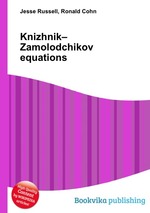Knizhnik–Zamolodchikov equations
Jesse Russell Ronald Cohn
бумажная книга
High Quality Content by WIKIPEDIA articles! In mathematical physics the Knizhnik–Zamolodchikov equations or KZ equations are a set of additional constraints satisfied by the correlation functions of the conformal field theory associated with an affine Lie algebra at a fixed level. They form a system of complex partial differential equations with regular singular points satisfied by the N-point functions of primary fields and can be derived using either the formalism of Lie algebras or that of vertex algebras. The structure of the genus zero part of the conformal field theory is encoded in the monodromy properties of these equations. In particular the braiding and fusion of the primary fields (or their associated representations) can be deduced from the properties of the four-point functions, for which the equations reduce to a single matrix-valued first order complex ordinary differential equation of Fuchsian type. Originally the Russian physicists Vadim Knizhnik and Alexander Zamolodchikov deduced the theory for SU(2) using the classical formulas of Gauss for the connection coefficients of the hypergeometric differential equation.


